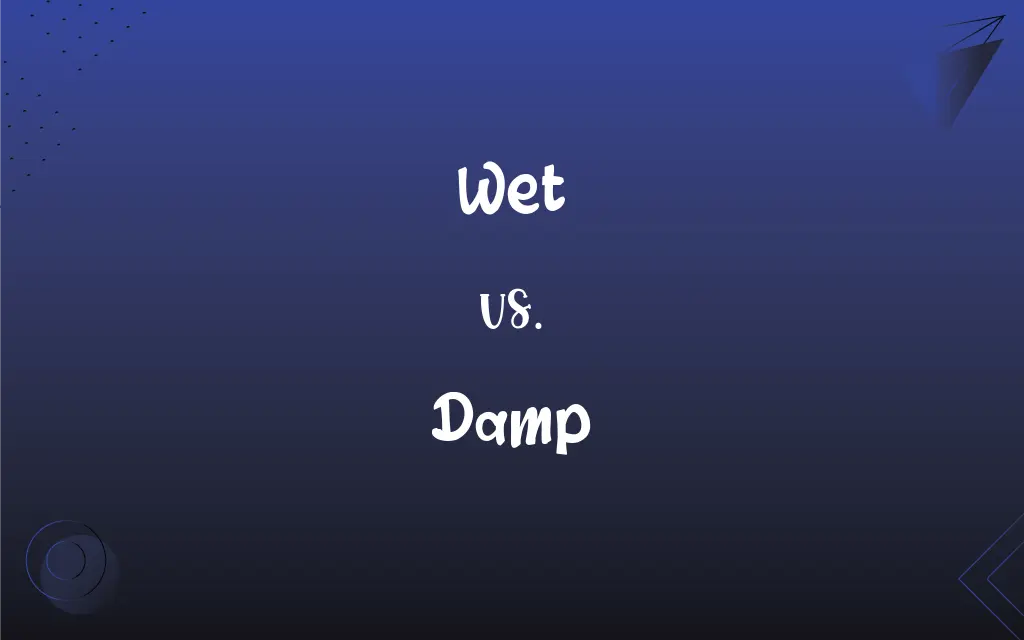Wet vs. Damp: What's the Difference?
Edited by Aimie Carlson || By Janet White || Updated on November 14, 2023
Wet refers to covered or saturated with liquid; Damp refers to slightly wet, often in a way that is unpleasant or uncomfortable.

Key Differences
'Wet' describes a condition where something is soaked or saturated with a liquid, implying a greater degree of moisture. 'Damp,' on the other hand, suggests a lesser amount of moisture, typically enough to be noticeable but not saturated.
Wetness often results from immersion in liquid or being in heavy rain, leading to a state where the liquid is visibly present. Dampness, however, usually arises from exposure to a small amount of moisture, resulting in a slightly wet surface or texture.
An object that is wet can drip or have a sheen of liquid, indicating a high level of moisture. Damp objects do not usually drip or have excess moisture but feel slightly moist to the touch.
The term 'wet' is used in a wider range of contexts, from weather conditions to describing liquids themselves. 'Damp' is more specific, often relating to conditions like humidity, mildew, or slight wetness in materials.
'Wet' indicates a higher degree of moisture, often to the point of being soaked, while 'damp' denotes a milder level of wetness, often perceived as slightly moist or humid.
ADVERTISEMENT
Comparison Chart
Degree of Moisture
High, soaked or saturated
Low, slightly moist
Common Sources
Immersion in liquid, heavy rain
Humidity, light mist, minimal exposure to moisture
Visibility/Feel
Can drip, visibly wet
Does not drip, feels slightly moist
Usage Contexts
Broad (weather, liquids, conditions)
Specific (humidity, mildew, light moisture)
Implication
Excess moisture, often visibly present
Minimal moisture, often not visible but felt
ADVERTISEMENT
Wet and Damp Definitions
Wet
Saturated with liquid, not dry.
Her clothes were wet from the rain.
Damp
Having a level of moisture that is slightly higher than dry.
The damp air made the evening feel cooler.
Wet
Covered with or containing liquid.
The grass was wet with morning dew.
Damp
Slightly wet, often in a way that is uncomfortable.
The basement felt damp and chilly.
Wet
Involving the use or presence of water or another liquid.
They enjoyed a wet and wild rafting adventure.
Damp
Showing a small amount of moisture.
The towels were still damp from the wash.
Wet
Having a liquid surface; not solid.
The wet paint on the wall was still drying.
Damp
Characterized by a lack of complete dryness.
The damp ground was soft underfoot.
Wet
Characterized by the presence of water or moisture.
The wet season brings heavy rainfall.
Damp
Having a slight wetness often associated with confined spaces or humidity.
The damp walls indicated a need for better ventilation.
Wet
Covered or soaked with a liquid, such as water
A wet towel.
Damp
Slightly wet
A damp sponge.
Wet
Not yet dry or firm
Wet paint.
Damp
Humid
Damp air.
Wet
Stored in or prepared with water or other liquids.
Damp
(Archaic) Dejected; depressed.
FAQs
What does it mean when something is described as wet?
Being wet means being covered with or saturated in liquid, often visibly moist.
Can something be both wet and damp?
Yes, an object can be wet in parts and damp in others, depending on the amount of moisture.
Is wetness always related to water?
Mostly, but 'wet' can refer to any liquid, not just water.
How does dampness affect materials?
Dampness can cause materials to feel slightly moist, and over time, it can lead to mold or mildew.
What are common causes of wetness?
Common causes include rain, spills, submersion in water, or contact with other liquids.
Can air be damp?
Yes, air can be damp when it contains a higher level of moisture, often felt as humidity.
Is damp always a negative condition?
Not always, but damp often implies an uncomfortable or undesirable level of moisture.
Can wet conditions lead to damage?
Yes, prolonged wet conditions can damage materials, cause rot, or lead to mold growth.
Can damp conditions be beneficial?
In some cases, like in controlled agricultural settings, a certain level of dampness can be beneficial.
Does damp always mean the presence of water?
Damp generally refers to the presence of a small amount of moisture, usually water.
How can you tell if a surface is wet?
A wet surface is usually visibly moist, and it might drip or have a sheen of liquid.
Is a damp environment good for health?
Generally, excessively damp environments are not good for health as they can promote mold growth and respiratory issues.
Can clothing be damp without being wet?
Yes, clothing can feel damp if it contains a small amount of moisture without being fully wet.
What are the signs of a damp environment?
Signs include a musty smell, visible mold, and a general feeling of moisture in the air.
Is damp always related to humidity?
Often, but dampness can also come from other sources of slight moisture.
How does wetness affect temperature perception?
Wet conditions, especially with wind, can make temperatures feel colder due to increased heat loss.
How do you prevent dampness in a home?
Preventing dampness involves proper ventilation, dehumidifying, and addressing any leaks or moisture sources.
Does dampness affect indoor air quality?
Yes, dampness can lead to poor indoor air quality, often due to mold or mildew growth.
How do you dry something that is wet?
Drying can be done through exposure to air, heat, or sunlight, or using a dryer.
Can something become wet without direct contact with liquid?
Yes, through condensation or high humidity, objects can become wet without direct liquid contact.
About Author
Written by
Janet WhiteJanet White has been an esteemed writer and blogger for Difference Wiki. Holding a Master's degree in Science and Medical Journalism from the prestigious Boston University, she has consistently demonstrated her expertise and passion for her field. When she's not immersed in her work, Janet relishes her time exercising, delving into a good book, and cherishing moments with friends and family.
Edited by
Aimie CarlsonAimie Carlson, holding a master's degree in English literature, is a fervent English language enthusiast. She lends her writing talents to Difference Wiki, a prominent website that specializes in comparisons, offering readers insightful analyses that both captivate and inform.































































